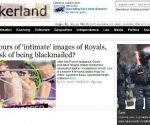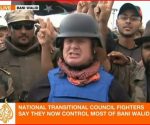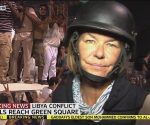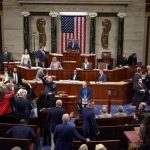Archive: Libyan elections: possible farce, and a show to legitimise current power-holders
First published 06 Jul 2012, Luikkerland site.
The Libyan elections are set to take place tomorrow, and whenever mention is made of them in the corporate-media, it is also appended with a piece of data that is supposed to mask all the glaringly obvious problems – which are glossed over in a straight faced manner – and give the whole exercise a sheen of wholesomeness so that the unwitting corporate-media consumer believes that NATO’s brutal war against the sovereign Libyan Jamahiriya was justified. The magical piece of data is that these elections will be the first ‘free elections’ in over 50 years – and it cannot be true. Many people in Libya will not be eligible to vote; lots – and the numbers are unknown – are dead or in unauthorised prisons because of their political allegiances; and for the black African populations of whole towns, such as the well documented Tarwergha, that have been ethnically cleansed by NTC forces, although provision is supposed to have been made for “displaced persons”, their well-publicised appalling treatment at the hands of the people who are now in power might, to say the least, act as a deterrent and prevent them from registering (if any are still alive and remain in the country – that is).
The basic numbers alone reveal what a complete travesty the Libyan elections could very well turn out to be, and should be borne in mind when the likes of Obama, Cameron, Clinton and Hague boast about their accomplishment. Various reports seem to agree that 80% of eligible voters have registered to vote – which is around 2.7 million people. This is misleading – as it probably was supposed to be; according to Article 9 of Election Law 4/2012, an eligible voter must be: a Libyan citizen; 18 years of age; legally competent; registered to vote; unaffiliated with military institutions; and never convicted of a felony or misdemeanour involving moral turpitude unless rehabilitated. Putting aside the conditions whereby the authorities can arbitrarily exclude someone, and the clear implication for dictatorship whereby a citizen’s eligibility is dependent on some other technicality which a government can introduce, an eligible voter is clearly a citizen who is registered to vote. It means that there are only 2.7 million eligible voters in Libya.
In the cold light of scrutiny, the 2.7 million figure is not the marvellous statistic it is always presented to be by happy-clappy Liberal-Fascist corporate-media outlets, especially when one also considers how the population of Libya, at least as it was estimated to be in July 2012, is 6.7 million. How this figure relates to the many people who were murdered in what was essentially an invasion by and for NATO is not known, but even at face value it suggests that there is a huge swathe of Libyan citizenry who are not allowed to vote. What this actual number could be is something that is hard to discern. Given that a UN survey in 2010 put the percentage of the population who are above the age of 15 (voting age is 18) at roughly 70%, it means, at a conservative guess, that perhaps a million and a half people are not eligible to vote.
A more startling figure is the reckoning, that has been published in various places, that 2.7 million people only represents 28% of the total population. How this surprising figure was derived is unknown, but it could be based on the fact that a chart on a Wikipedia page concerned with Libyan demographics shows that Libya had a total population of 9,655,000 in 2010. The source of this number does not seem to be cited, and it is not known if this number includes migrant workers who are not citizens. Actually, the example serves to remind that understanding how many people live and work in Libya seems to be a perpetual mystery; a census taken in 2006 looked like it had returned a count that was much lower than it ought to be (5 million). And besides which, even if the 28% figure can be discounted, it may still be true that anything up to 20-25% of people – a figure that is no less shocking – will not be eligible to vote. It is a figure that makes pre-election NTC worries about how the eastern peoples will boycott the elections and render them illegitimate seem highly trivial.
The possible boycott threatened by the self-appointed Barqa Council, which claims to represent the eastern region, does have the potential to undermine the legitimacy of any resultant government – the General National Congress – because of how it will not represent a third, geographically speaking, of the country. The people in the east have separatist tendencies, and perhaps feel that this is not taken into consideration when the region is allowed an unequal distribution of seats in the central national parliament. Barqa objections, however, have so far been sidelined by the National Transition Council, and catastrophic consequences have followed; last week protesters stormed an election commission office in Benghazi. As recently as yesterday, the main storage centre for election materials in the eastern Libyan town of Ajdabiya caught fire in a suspected arson attack. In fact, it seems that the NTC have considered the situation to be so unstable that they declared a state of emergency on Wednesday, to last until Saturday’s parliamentary elections.
As well as the risk, by violence, to an election that is up to the standards of international backers (an election that isn’t a farce is an entirely different thing), apathy is also set to take its toll. Reuters recently interviewed a resident of Sirte who, observing the wreckage of his home that is still razed to the ground by the combined NATO and NTC attacks of last year, cannot see the point in voting even though he seems to be registered. People in Bani Walid also report, via LibyaSOS, that there is no campaigning in their town; the same web news outlet also reports that the elections have been postponed in the southeastern district of Kufra due to instability, and that in Al Abyar, an eastern Libyan province, candidates have been withdrawn from the elections.
The anticipated result of elections should also provide a clue as to who makes up the electorate; the Islamist Muslim Brotherhood, with candidates harbouring Islam-is-the-constitution beliefs – to the horror of all sides who recognise that Libya’s minorities must be protected by legal definition – is expected to head the government and to fill up most positions in the ministries. The whitewash applied to the rise of Islamism by corporate-media would be amusing if it wasn’t so dangerous; the BBC even straight-facedly claimed that the election was a “time for women”, while publishing the following in the very next sentence:
[Women’s] faces in campaign posters end up being neatly cut out, apparently by a mysterious group of extremely religious men roaming the streets.
This is unlikely to be the work, as the reportage perhaps would like readers to believe, of just one group of zealots, and more realistically represents newly institutionalised Islamism.
The same BBC article featured an interview with businessman and political activist Mohamed Bussei, a proponent of a proper constitution before elections, rather than what threatens to be a transition of NTC secret government by arbitrary decree into the same thing under a different name. He thinks that the elections are all about legitimising the key players already in power:
The head of every government organisation in Libya [now] is run by the Muslim Brotherhood and they are running in the elections with more than one party, and with independent names.
Mr Bussei is referring to the way that the Muslim Brotherhood are obviously conspiring to abuse, as the Telegraph puts it, a “complicated electoral system designed to ensure that no party sweeps the board in the elections for the assembly to oversee the new government and draw up a constitution”.
Indeed, the British corporate-media is, without flinching, reporting the shady deals being made to keep the likes of the NTC’s Jibril in a position where the perks will keep coming.
Negotiations between the Muslim Brotherhood and a secular-based political movement led by former interim prime minister Mahmoud Jibril have focused on forming a post-election government as soon as the result is known.
An adviser to Mr Jibril said the former prime minister was likely to take the post of figurehead president with Mustafa Abu Shagour, currently interim deputy prime minister of the Muslim Brotherhood, taking the prime minister’s slot as head of government.
If one gains the impression, from reading the above extract taken from the Telegraph, that negotiations are taking place to distribute the power even before elections have taken place, then the same article confirms it:
Any coalition government would grant a prominent place to the al-Watan party of Abdulhakim Belhaj, sources said. Mr Belhaj acknowledged that the talks were under way.
Belhadj is an embarrassing figure for corporate-media who have been forced to print disclaimers about him, rather like the following one:
Mr Belhaj, [is] the former commandant of the now dissolved terrorist outfit, Libyan Islamic Fighting Group, which had ties with al-Qaeda before disavowing violence.
Where journalists gain an understanding that Belhadj disavowed violence – what with the LIFG actually dissolving into al-Qaeda, and Belhadj leading the fighting against the sovereign Libyan Government who called him an al-Qaeda terrorist, before shipping to Turkey to organise terrorist incursions into Syria and a supply of weapons – is a complete mystery to those who, not being whores, nor intelligence agents, and therefore without allegiances to British and American governmental deigns on the region, have followed events in Libya.
Links:
Our beginner’s guide to the crimes of Belhadj (and how you are paying for them)
Telegraph: Libyan armed militias ‘have stranglehold on country’
Election boycott threatens to derail Libya’s transition


















